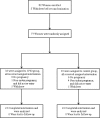Intravenous immunoglobulin and idiopathic secondary recurrent miscarriage: a multicentered randomized placebo-controlled trial
- PMID: 20634190
- PMCID: PMC2923000
- DOI: 10.1093/humrep/deq179
Intravenous immunoglobulin and idiopathic secondary recurrent miscarriage: a multicentered randomized placebo-controlled trial
Abstract
Background: Idiopathic secondary recurrent miscarriage may be associated with an abnormal maternal immune response to subsequent pregnancies. Intravenous immunoglobulin (IVIG) has been studied in randomized controlled trials (RCTs) with conflicting results. Therefore, a definitive trial was proposed.
Methods: We conducted an investigator-initiated, multicentered, randomized, double-blinded, placebo-controlled trial comparing IVIG with saline in women with idiopathic secondary recurrent miscarriage, defined as a history of at least one prior ongoing pregnancy followed by three or more consecutive unexplained miscarriages. Subjects received either IVIG 500 mg/kg or the equivalent volume of normal saline. Preconception infusions were administered 14-21 days from the projected next menstrual period. With documentation of pregnancy, the subject received the same infusion every 4 weeks until 18-20 weeks of gestation. The primary outcome was an ongoing pregnancy of at least 20 weeks of gestation.
Results: A total of 82 patients enrolled, of whom 47 had an index pregnancy. All ongoing pregnancies resulted in live births. Therefore, the live birth rates were 70% (16/23) in the IVIG group and 63% (15/24) in the control group (P = 0.760); odds ratio (OR) 1.37 [95% confidence interval (CI) 0.41-4.61]. Including only clinical pregnancies (embryo with cardiac activity at 6 weeks of gestation), the live birth rates were equivalent, 94% (16/17) and (15/16), respectively (P > 0.999); OR 1.07 (95% CI 0.06-18.62). Meta-analysis of randomized controlled trials (RCTs) evaluating IVIG for idiopathic secondary recurrent miscarriage revealed live birth rates of 70% (31/44) in the IVIG group and 62% (28/45) in the control group (P = 0.503); common OR 1.44 (95% CI 0.59-3.48).
Conclusions: This is the largest RCT to date in which IVIG was evaluated in women with idiopathic secondary recurrent miscarriage; no treatment benefit was found. The meta-analysis, which combined our study results with two prior RCTs, also showed no significant effect of treatment with IVIG.
Trial registration: ClinicalTrials.gov NCT00606905.
Figures


Comment in
-
Intravenous immunoglobulin and idiopathic secondary recurrent miscarriage: methodological problems.Hum Reprod. 2011 Sep;26(9):2586-7; author reply 2587-9. doi: 10.1093/humrep/der185. Epub 2011 Jun 24. Hum Reprod. 2011. PMID: 21705372 No abstract available.
References
-
- Brandt JT, Triplett DA, Alving B, Scharrer I. Criteria for the diagnosis of lupus anticoagulants: an update. On behalf of the Subcommittee on Lupus Anticoagulant/Antiphospholipid Antibody of the Scientific and Standardisation Committee of the ISTH. Thromb Haemost. 1995;74:1185–1190. - PubMed
-
- Christiansen OB, Mathiesen O, Husth M, Rasmussen KL, Ingerslev HJ, Lauritsen JG, Grunnet N. Placebo-controlled trial of treatment of unexplained secondary recurrent spontaneous abortions and recurrent late spontaneous abortions with i.v. immunoglobulin. Hum Reprod. 1995;10:2690–2695. - PubMed
-
- Christiansen OB, Pedersen B, Rosgaard A, Husth M. A randomized, double-blind, placebo-controlled trial of intravenous immunoglobulin in the prevention of recurrent miscarriage: evidence for a therapeutic effect in women with secondary recurrent miscarriage. Hum Reprod. 2002;17:809–816. doi:10.1093/humrep/17.3.809. - DOI - PubMed
-
- Clifford K, Rai R, Regan L. Future pregnancy outcome in unexplained recurrent first trimester miscarriage. Hum Reprod. 1997;12:387–389. doi:10.1093/humrep/12.2.387. - DOI - PubMed
-
- Clifford K, Flanagan AM, Regan L. Endometrial CD56+ natural killer cells in women with recurrent miscarriage: a histomorphometric study. Hum Reprod. 1999;14:2727–2730. doi:10.1093/humrep/14.11.2727. - DOI - PubMed
Publication types
MeSH terms
Substances
Associated data
Grants and funding
LinkOut - more resources
Full Text Sources
Other Literature Sources
Medical

